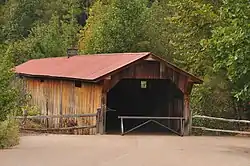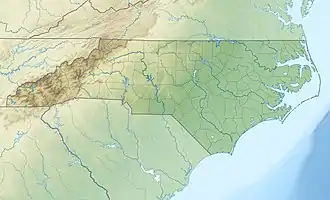| Pocket Creek Tributary to Deep River | |
|---|---|
 GILLIAM PARK COVERED BRIDGE, LEE COUNTY, NC | |
 Location of Pocket Creek mouth  Pocket Creek (Deep River tributary) (the United States) | |
| Location | |
| Country | United States |
| State | North Carolina |
| County | Lee |
| Physical characteristics | |
| Source | divide between Pocket Creek, Herds Creek, and Little Crane Creek |
| • location | White Hill, North Carolina |
| • coordinates | 35°23′11″N 079°16′46″W / 35.38639°N 79.27944°W[1] |
| • elevation | 475 ft (145 m)[2] |
| Mouth | Deep River |
• location | about 1.5 miles south of Gulf, North Carolina |
• coordinates | 35°32′03″N 079°16′49″W / 35.53417°N 79.28028°W[1] |
• elevation | 208 ft (63 m)[2] |
| Length | 16.44 mi (26.46 km)[3] |
| Basin size | 37.65 square miles (97.5 km2)[4] |
| Discharge | |
| • location | Deep River |
| • average | 42.61 cu ft/s (1.207 m3/s) at mouth with Deep River[4] |
| Basin features | |
| Progression | Deep River → Cape Fear River → Atlantic Ocean |
| River system | Deep River |
| Tributaries | |
| • left | Dry Fork Little Pocket Creek |
| • right | Raccoon Creek |
| Bridges | Villanow Drive, Chris Cole Road, Center Church Road, Covered Bridge Lane, Henley Road, Steel Bridge Road, Carbonton Road (NC 42) |
Pocket Creek is a 16.44 mi (26.46 km) long 3rd order tributary to the Deep River in Lee County, North Carolina. The longest covered bridge (Gilliam Park Covered Bridge) in North Carolina crosses this creek.[5]
Course
Pocket Creek rises in a pond in White Hill, North Carolina and then flows north to join the Deep River about 1.5 miles south of Gulf, North Carolina.[2]
Watershed
Pocket Creek drains 37.65 square miles (97.5 km2) of area, receives about 47.9 in/year of precipitation, has a wetness index of 390.19 and is about 63% forested.[4]
See also
External links
References
- 1 2 "GNIS Detail - Pocket Creek". geonames.usgs.gov. US Geological Survey. Retrieved 18 August 2020.
- 1 2 3 "Pocket Creek Topo Map in Lee". TopoZone. Locality, LLC. Retrieved 18 August 2020.
- ↑ "ArcGIS Web Application". epa.maps.arcgis.com. US EPA. Retrieved 18 August 2020.
- 1 2 3 "Pocket Creek Watershed Report". US EPA Geoviewer. US EPA. Retrieved 18 August 2020.
- ↑ Jarvis, Robin (17 October 2019). "The Longest Covered Bridge In North Carolina, At Ole Gilliam Mill Park, Is 140 Feet Long". OnlyInYourState. Onlyinyourstate. Retrieved 18 August 2020.
This article is issued from Wikipedia. The text is licensed under Creative Commons - Attribution - Sharealike. Additional terms may apply for the media files.